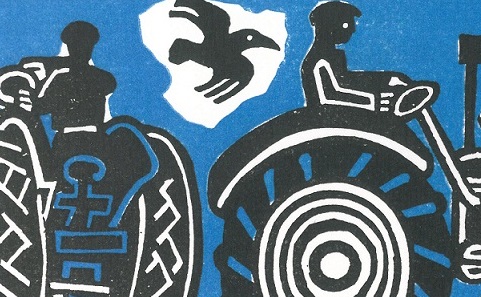On St Patrick’s day we mark the anniversary of the arrival of the Wellington Archive at Southampton in 1983. Since then, the Special Collections has acquired a wide range of material that relates to this archive and we take the opportunity to explore some of these.
The Wellington Archive [MS61] represents the political, military and official papers of Wellington, so collections that provide a more personal perspective on the Duke are always of interest. Christopher Collins entered Wellington’s service in 1824 and worked as his confidential servant for the remainder of the Duke’s life. Amongst the papers in this collection [MS69] are notes and letters from the Duke issuing instructions about ordering straps with buckles and boots, arrangements for mending razors, for preparations for his room at Walmer Castle and the cleaning and maintenance of uniforms.
![Note from Wellington to Collins sending instructions for preparing his room at Walmer Castle, 1838 [MS69/2/15]](https://specialcollectionsuniversityofsouthampton.files.wordpress.com/2019/03/ms69_2_15_crop.jpg?w=320&h=341)
Note from Wellington to Collins sending instructions for preparing his room at Walmer Castle, 13 September 1839 [MS69/2/15]: “have some fire in my room; some hot water for tea; and some boiling sea water for my feet”.
A small series of correspondence of Wellington, and Deputy Commissary General William Booth, which is a more recent acquisition, provide some insight into the management of Wellington’s estates at Waterloo, 1832-52 [MS414].
A number of military archive collections, including some of officers who served with Wellington, now join company with the Wellington Archive at Southampton. Papers of Sir John Malcolm, 1801-16, [MS308] provide important evidence for Wellington in India, at a formative stage of his career, in comparatively informal and personal correspondence with a friend and political colleague; it includes Wellington’s letters written in the field throughout the Assaye campaign. MS321 is composed of seven volumes of guardbooks of correspondence and papers of Lieutenant Colonel John Gurwood, who was editor of Wellington’s General Orders and Dispatches. The collection relates to Gurwood’s military career as well as his editorial work.![Letter from Gurwood to his mother in which he reports he led the "forlorn hope" at Ciudad Rodrigo, 20 January 1812 [MS321/7]](https://specialcollectionsuniversityofsouthampton.files.wordpress.com/2019/03/ms321_5_20jan1812_0001.jpg?w=425&h=535)
Letter from Gurwood to his mother in which he reports he led the “forlorn hope” at Ciudad Rodrigo, 20 January 1812 [MS321/7]
A journal sent by General Francisco Copons y Navia to the Duke of Wellington details the operations undertaken by the Spanish First Army for the period 2-20 June 1813 in relation to those of General Sir John Murray. Murray had landed with a British force at Salou in Catalonia on 3 June and laid siege to Tarragona [MS253].
Formerly part of a larger series of documents, Special Collections holds two booklets, signed by F.Mongeur, the Commissaire Ordonnateur for Barcelona, at Perpignan on 3 June 1814, that relate to the administration of Barcelona in 1814. The first, the ‘Journal du blocure de la place de Barcelonne’ has a daily record from 1 February to 3 June 1814 of the French forces [MS360/1]. The succeeding document in the series is a general report, in French, on the administration of the siege of Barcelona by the armée d’Aragon et de Catalogne, between 1 January and 28 May 1814, which gives details of the period of the evacuation of the place, as well as of the food and consumption of foodstuffs and expenditure on supplies during this period. There is a detailed analysis of the composition of the forces, the different corps of troops, companies and detachments making up the garrison at Barcelona [MS360/2]. Material relating to politics in the Wellington Archive is paralleled by that within a number of significant other collections at Southampton. The archive of the Parnell family, Barons Congleton [MS64] which contains extensive material relating to Irish politics. Amongst the papers of Sir John Parnell, second Baronet, is material for the Union of Ireland and Great Britain, whilst the papers of the first Baron Congleton include material about Roman Catholic emancipation.![Letter from Daniel O'Connell to Sir Henry Parnell, 13 June 1815 [MS64/17/2]](https://specialcollectionsuniversityofsouthampton.files.wordpress.com/2019/03/ms64_17_2_cover_crop.jpg?w=500)
Letter from Daniel O’Connell to Sir Henry Parnell, 13 June 1815, relating to Catholic emancipation [MS64/17/2]
To find out more about Wellington, or research that has drawn on the collections held at Southampton, why not join us at this year’s Wellington Congress. Registration is open until the end of March.


![Red ribbon of the Order of the Bath [MS69/4/11]](https://specialcollectionsuniversityofsouthampton.files.wordpress.com/2019/03/ms69_4_11.jpg?w=500&h=220)
![Recipe for "onion porage" [MS69/4/19]](https://specialcollectionsuniversityofsouthampton.files.wordpress.com/2019/03/ms69_4_19r.jpg?w=287&h=439)
![Illustration of the Duke of Wellington [MS351 A4170/9]](https://specialcollectionsuniversityofsouthampton.files.wordpress.com/2019/03/ms351_6_a4170_9.jpg?w=450&h=353)
!["Journal du blocure de la place de Barcelonne" [MS360/1]](https://specialcollectionsuniversityofsouthampton.files.wordpress.com/2019/03/ms360_1_f1r_crop.jpg?w=381&h=567)
![Signature of Daniel O'Connell, 1815 [MS64/17/2]](https://specialcollectionsuniversityofsouthampton.files.wordpress.com/2019/03/ms64_17_2_signature_1.jpg?w=400&h=135)
![Letter from Simon Bolivar to Lord Wellesley, 22 January 1811 [MS63/9/7]](https://specialcollectionsuniversityofsouthampton.files.wordpress.com/2019/03/ms63972.jpg?w=380&h=435)





![Pages from a Dorset carol book, 1803: part of the Rollo Woods music collection [MS 442/1/2]](https://specialcollectionsuniversityofsouthampton.files.wordpress.com/2019/01/ms442_1_2_.jpg?w=500&h=320)










![Men's football team, 1953-4 [photo_MS1_7_291_22_4] Men's football team, 1953-4 [photo_MS1_7_291_22_4]](https://live.staticflickr.com/65535/50089268168_f26eed63ef_s.jpg)
![Women's rowing team, 1961-2 [MS1_7_291_22_4] Women's rowing team, 1961-2 [MS1_7_291_22_4]](https://live.staticflickr.com/65535/50090079577_3b7acbde42_s.jpg)
![Men's rugby team, 1953-4 [MS1_7_291_22_4] Men's rugby team, 1953-4 [MS1_7_291_22_4]](https://live.staticflickr.com/65535/50089268523_4f2c587220_s.jpg)
![Women's hockey team, 1953-4 [MS1_7_291_22_4] Women's hockey team, 1953-4 [MS1_7_291_22_4]](https://live.staticflickr.com/65535/50090079692_28114e9c7d_s.jpg)